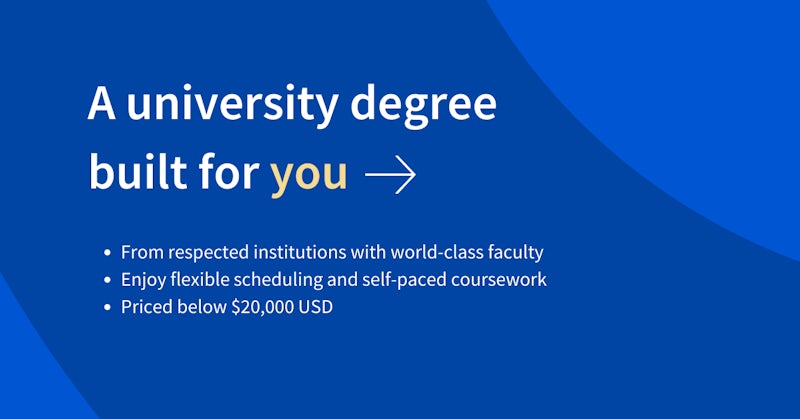Bachelor’s Degree in Computer Science: A Guide
Learn what it takes to earn a bachelor's degree in computer science, including the coursework and what you can do after earning the degree.
![[Featured image] A person wearing glasses and a plaid shirt works on code on a desktop.](https://d3njjcbhbojbot.cloudfront.net/api/utilities/v1/imageproxy/https://images.ctfassets.net/wp1lcwdav1p1/7JwZNrzXiFWPAkdcenHTRN/debb648bfa04176d87ae8702bf6607f8/GettyImages-1280720394.jpg?w=1500&h=680&q=60&fit=fill&f=faces&fm=jpg&fl=progressive&auto=format%2Ccompress&dpr=1&w=1000)
A bachelor’s degree in computer science—also called a CS degree—is an undergraduate program that typically involves learning about the fundamentals of computer systems and operations before focusing on a more specific area, like data science, machine learning, or game design.
With your bachelor’s in computer science, you can pursue an array of jobs, such as systems architect, web developer, video game developer, or UX designer. Computer science and IT professionals tend to earn higher than average salaries. The US Bureau of Labor Statistics found that these occupations in the United States earned a median annual wage of $104,420 compared to $48,060, the median wage for all occupations [1].
In this article, we’ll discuss what it takes to earn a bachelor’s degree in computer science, the courses you can expect, and what you can do with the degree after graduation.
Bachelor’s degrees in computer science
Earning a bachelor’s degree in computer science takes four to five years, depending on how quickly you complete the 120 minimum credits usually needed to graduate.
When you major in computer science, you may receive a Bachelor of Science or a Bachelor of Arts. Generally, BS and BA degrees emphasize different approaches to education—the former can be more technical, while the latter can be more theoretical—but no matter the degree type, computer science tends to follow an interdisciplinary approach that involves highly technical subjects. That being said, BA degrees may be useful for students interested in exploring opportunities outside of technology and engineering.
It’s also possible to earn your bachelor’s degree in computer science online. In fact, you may find that doing so costs less than attending college in person—and you don’t have to relocate. Learn more about some of the distinctive benefits that come with learning online.

Which bachelor’s degree is best for computer science
Computer science is a large term encompassing several sub-areas. Depending on the school you attend, you may have the option to choose one and take courses related to it.
Popular areas in computer science include:
Machine learning: Develop algorithms and processes that facilitate computer learning.
Robotics: Design and build products that use complex algorithms to perform various functions.
Security: Design and implement a mix of hardware and software to make computer systems and networks more secure.
Software engineering: Learn one or more programming languages to create and develop applications, software, and other programs.
Systems/networking: Design and maintain computer or network systems to ensure that they communicate and cooperate efficiently.
User interfaces and graphics: A mix of creativity and technicality that involves developing images and video by applying various algorithms and theories.
Do employers prefer a BA or BS in computer science?
Employers typically accept either degree option, focusing more on your skills, knowledge, and ability to apply both to your work. That said, when choosing between a BA and a BS in computer science, consider your overall goals. A BA usually includes a broader range of electives encompassing the humanities for a robust foundation, while a BS typically focuses more on math, science, and technical skills.

Computer science degree requirements: Common curriculum
Computer science has a reputation for being a hard major because of how technical some of the subjects can be. Many programs expect you to learn a programming language (if you don’t already know one), take advanced math classes, and solve complex problems. But it can be an exciting challenge if you’re interested in the material.
Computer science bachelor’s coursework can include:
Introduction to computer science
Calculus
Basic algorithms
Data structures and analysis
Data mining
Operating systems
Software engineering
Computer graphics
Quantum computing
Introduction to machine learning
User interface development
Computer game design
Skills
Over the course of your computer science bachelor’s degree, you will likely develop and strengthen certain skills through the courses you take and the projects you complete. Companies have a vested interest in finding candidates with a range of workplace skills and technical skills. Not only can the skills below make you a more attractive job candidate, but they can also contribute to your personal growth.
| Workplace skills | Technical skills |
|---|---|
| Organization | Programming language (Python, C++) |
| Attention to detail | Data analysis |
| Time management | Software development |
| Communication | Quality control analysis |
| Problem-solving | Project management |
Learn more: What Are Job Skills and Why Do They Matter?
Internships
As an undergraduate student, you may have access to computer science internships through your school. Completing an internship can be an excellent opportunity to gain experience, learn more about the industry in which you intern, add to your portfolio and resume, and network.
What can you do with a computer science bachelor’s degree?
Computer science graduates tend to be in high demand. Over the next decade, openings for web developers and digital designers are expected to grow by 8 percent, software developers by 17 percent, and information security analysts by 33 percent [2, 3, 4].
Beyond the roles we’ve listed below, learn more about the top 5 entry-level computer science jobs you can explore after earning your bachelor’s degree and what you can do with a computer science degree.
| Job title | Average US base salary |
|---|---|
| Full-stack developer | $91,844 [5] |
| User interface designer | $77,645 [6] |
| Software engineer | $117,877 [7] |
| Product manager | $124,476 [8] |
| Data scientist | $117,417 [9] |
It’s worth noting that while a growing number of employers have been doing away with bachelor’s degree requirements for entry-level roles, the degree can still be useful as you advance in your career. While you may be able to get started in a computer science-related role, you may eventually need a bachelor’s degree to pursue more senior-level opportunities.
Is a computer science bachelor’s right for you?
Majoring in computer science can be a strong choice if you enjoy advanced mathematics and physical science courses and there’s an area of computer science that interests you.
Think about your interest in the subject matter, your career aspirations after college, and your resources. With the latter, it may help to start learning a programming language, like Python, before beginning your bachelor’s so you have a strong foundation in place.
Ultimately, picking a college major is an opportunity to explore a subject you’re interested in, align your education with your values, or begin preparing for a career. Learn more about how to pick the best major for you. If computer science seems like a good fit, then you may also want to consider a complementary college minor that expands your knowledge in useful ways.
Explore your options for a computer science bachelor's degree
Earn your Bachelor of Science in Computer Science from the University of London on Coursera. You can focus on machine learning, game design, user experience, or many other areas. Or browse new computer science courses and join Coursera for free to start learning today.

Article sources
US Bureau of Labor Statistics. “Computer and Information Technology Occupations, https://www.bls.gov/ooh/computer-and-information-technology/home.htm.” Accessed January 8, 2025.
US Bureau of Labor Statistics. “Web Developers and Digital Designers, https://www.bls.gov/ooh/computer-and-information-technology/web-developers.htm.” Accessed January 8, 2025.
US Bureau of Labor Statistics. “Software Developers, Quality Assurance Analysts, and Testers, https://www.bls.gov/ooh/computer-and-information-technology/software-developers.htm.” Accessed January 8, 2025.
US Bureau of Labor Statistics. “Information Security Analysts, https://www.bls.gov/ooh/computer-and-information-technology/information-security-analysts.htm.” Accessed January 8, 2025.
Glassdoor. “How much does a Full-Stack Developer make?, https://www.glassdoor.com/Salaries/full-stack-developer-salary-SRCH_KO0,20.htm.” Accessed January 8, 2025.
Glassdoor. “How much does a User Interface Designer make?, https://www.glassdoor.com/Salaries/united-states-user-interface-designer-salary-SRCH_IL.0,13_IN1_KO14,37.htm.” Accessed January 8, 2025.
Glassdoor. “How much does a Software Engineer make?, https://www.glassdoor.com/Salaries/united-states-software-engineer-salary-SRCH_IL.0,13_IN1_KO14,31.htm.” Accessed January 8, 2025.
Glassdoor. “How much does a Product Manager make?, https://www.glassdoor.com/Salaries/united-states-product-manager-salary-SRCH_IL.0,13_IN1_KO14,29.htm.” Accessed January 8, 2025.
Glassdoor. “How much does a Data Scientist make?, https://www.glassdoor.com/Salaries/united-states-data-scientist-salary-SRCH_IL.0,13_IN1_KO14,28.htm.” Accessed January 8, 2025.
Coursera Staff
Editorial Team
Coursera’s editorial team is comprised of highly experienced professional editors, writers, and fact...
This content has been made available for informational purposes only. Learners are advised to conduct additional research to ensure that courses and other credentials pursued meet their personal, professional, and financial goals.